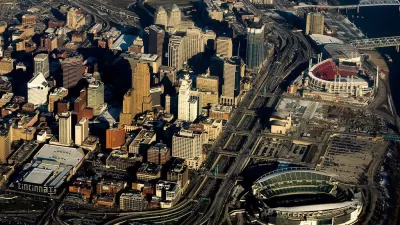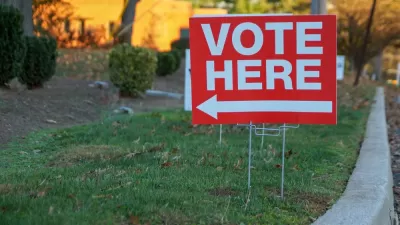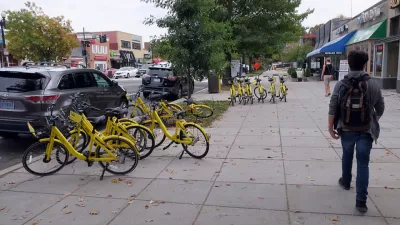Bike-share is continuing its march towards world domination, with seemingly every large Midwestern American city now jumping on the bike lending bandwagon, reports Angie Schmitt.
Pittsburgh, Columbus, Indianapolis, Cleveland, Detroit, Cincinnati, Milwaukee, Chicago, Minneapolis - the list of Midwestern cities that have already, or are hoping to, establish bike-share systems is a testament to the incredible popularity of a concept that's only found its footing in the U.S. in the past few years. Schmitt examines the trend, and the ways in which Midwestern cities have learned from, and adapted, the approach to building such systems undertaken by more dense pioneers.
"Midwestern cities have been inspired by some of the more spectacular examples on the coasts, according to Eric Rogers, executive director of BikeWalkKC, the nonprofit organization that manages Kansas City’s bike-share system. Kansas City was a little ahead of the pack when it launched Kansas City B-Cycle, with 200 bikes at 12 stations, last summer."
“The last few years a lot of cities, especially in the Midwest, have seen good examples from places like Chicago and Portland and New York and D.C. of a lot of innovative facilities that are out there: cycle tracks, bike boxes, bike-sharing,” he said. “There’s so much more knowledge out there now that it’s easier to develop a solution and pursue it.”
"Midwestern metros have also been lured by the availability of new technology and the assistance of companies like B-Cycle and Alta Bikes that make installing these systems relatively easy and affordable," Schmitt adds. "But these new additions to the bike-share family have taken a markedly different approach than some large coastal cities."
“A lot of the Midwest cities started kind of small, maybe with 10 or 12 stations, and they’re growing more organically over time,” Rogers said. “It seems like a lot of the larger coastal cities have taken more of a big-bang approach.”
FULL STORY: Midwestern Cities Race to Adopt, and Grow, Bike-Share

Planetizen Federal Action Tracker
A weekly monitor of how Trump’s orders and actions are impacting planners and planning in America.

Maui's Vacation Rental Debate Turns Ugly
Verbal attacks, misinformation campaigns and fistfights plague a high-stakes debate to convert thousands of vacation rentals into long-term housing.

San Francisco Suspends Traffic Calming Amidst Record Deaths
Citing “a challenging fiscal landscape,” the city will cease the program on the heels of 42 traffic deaths, including 24 pedestrians.

Amtrak Rolls Out New Orleans to Alabama “Mardi Gras” Train
The new service will operate morning and evening departures between Mobile and New Orleans.

The Subversive Car-Free Guide to Trump's Great American Road Trip
Car-free ways to access Chicagoland’s best tourist attractions.

San Antonio and Austin are Fusing Into one Massive Megaregion
The region spanning the two central Texas cities is growing fast, posing challenges for local infrastructure and water supplies.
Urban Design for Planners 1: Software Tools
This six-course series explores essential urban design concepts using open source software and equips planners with the tools they need to participate fully in the urban design process.
Planning for Universal Design
Learn the tools for implementing Universal Design in planning regulations.
Heyer Gruel & Associates PA
JM Goldson LLC
Custer County Colorado
City of Camden Redevelopment Agency
City of Astoria
Transportation Research & Education Center (TREC) at Portland State University
Jefferson Parish Government
Camden Redevelopment Agency
City of Claremont





























